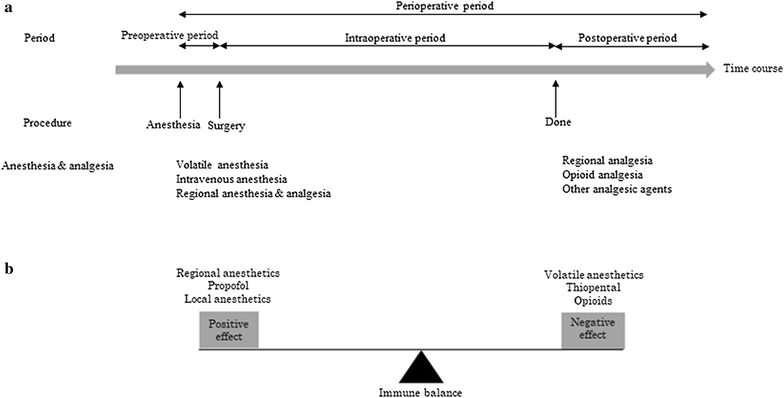Effects of surgery and anesthetic choice on immunosuppression and cancer recurrence
- PMID: 29347949
- PMCID: PMC5774104
- DOI: 10.1186/s12967-018-1389-7
Effects of surgery and anesthetic choice on immunosuppression and cancer recurrence
Abstract
Background: The relationship between surgery and anesthetic-induced immunosuppression and cancer recurrence remains unresolved. Surgery and anesthesia stimulate the hypothalamic-pituitary-adrenal (HPA) axis and sympathetic nervous system (SNS) to cause immunosuppression through several tumor-derived soluble factors. The potential impact of surgery and anesthesia on cancer recurrence was reviewed to provide guidance for cancer surgical treatment.
Methods: PubMed was searched up to December 31, 2016 using search terms such as, "anesthetic technique and cancer recurrence," "regional anesthesia and cancer recurrence," "local anesthesia and cancer recurrence," "anesthetic technique and immunosuppression," and "anesthetic technique and oncologic surgery."
Results: Surgery-induced stress responses and surgical manipulation enhance tumor metastasis via release of angiogenic factors and suppression of natural killer (NK) cells and cell-mediated immunity. Intravenous agents such as ketamine and thiopental suppress NK cell activity, whereas propofol does not. Ketamine induces T-lymphocyte apoptosis but midazolam does not affect cytotoxic T-lymphocytes. Volatile anesthetics suppress NK cell activity, induce T-lymphocyte apoptosis, and enhance angiogenesis through hypoxia inducible factor-1α (HIF-1α) activity. Opioids suppress NK cell activity and increase regulatory T cells.
Conclusion: Local anesthetics such as lidocaine increase NK cell activity. Anesthetics such as propofol and locoregional anesthesia, which decrease surgery-induced neuroendocrine responses through HPA-axis and SNS suppression, may cause less immunosuppression and recurrence of certain types of cancer compared to volatile anesthetics and opioids.
Keywords: Anesthetic agent; Anesthetic technique; Cancer recurrence; Cancer surgery; Immunosuppression.
Figures


References
-
- Lloyd JM, McIver CM, Stephenson SA, Hewett PJ, Rieger N, Hardingham JE. Identification of early-stage colorectal cancer patients at risk of relapse post-resection by immunobead reverse transcription-PCR analysis of peritoneal lavage fluid for malignant cells. Clin Cancer Res. 2006;12:417–423. doi: 10.1158/1078-0432.CCR-05-1473. - DOI - PubMed
Publication types
MeSH terms
Substances
LinkOut - more resources
Full Text Sources
Other Literature Sources
Medical

